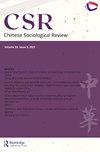Hukou stratification, class structure, and earnings in transitional China
IF 1.4
2区 社会学
Q2 SOCIOLOGY
引用次数: 7
Abstract
Abstract The massive economic transformation in China has triggered a vigorous scholarly debate on whether the persistent power of the state or the increasing market liberalization is the main driving force of inequality. In this article, we attempt to understand this debate through the lens of two coexisting stratification systems––the longstanding hukou (household registration) system and an emerging class structure. Using data from the Chinese General Social Survey from 2008 to 2015, we develop new typologies for hukou stratification and class structure and examine their relative contributions in determining workers’ earnings. We further investigate differences in their effects between the Inland and Coastal regions. We find that class ranks ahead of education and hukou as the strongest determinant of earnings in China as a whole. Regionally, hukou and class are strong determinants of earnings, but hukou has a relatively stronger effect in Inland China. The findings shed light on the changing stratification dynamics in transitional China and contribute to the literature on the market transition debate.转型期中国的户口分层、阶级结构与收入
中国大规模的经济转型引发了一场激烈的学术争论,争论的焦点是,究竟是国家持续的权力,还是日益增长的市场自由化,才是造成不平等的主要原因。在本文中,我们试图通过两种并存的分层制度——长期存在的户口制度和新兴的阶级结构——来理解这场争论。利用2008年至2015年中国综合社会调查的数据,我们开发了户口分层和阶级结构的新类型,并检验了它们在决定工人收入方面的相对贡献。我们进一步研究了它们在内陆和沿海地区的影响差异。我们发现,在整个中国,阶级排在教育和户口之前,是决定收入的最重要因素。从地区来看,户口和阶级是收入的重要决定因素,但户口在中国内地的影响相对更大。研究结果揭示了转型期中国不断变化的分层动态,并为市场转型辩论的文献做出了贡献。
本文章由计算机程序翻译,如有差异,请以英文原文为准。
求助全文
约1分钟内获得全文
求助全文

 求助内容:
求助内容: 应助结果提醒方式:
应助结果提醒方式:


